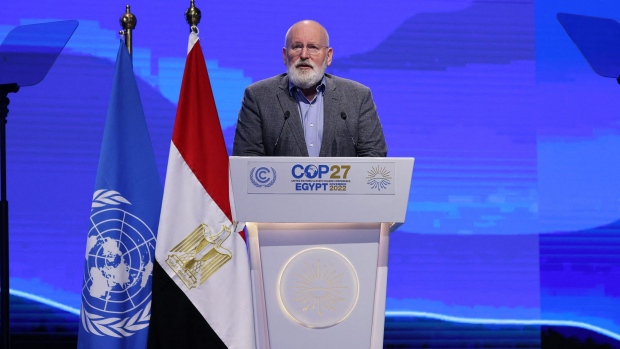Nov 17, 2022
EU Tries to Break COP27 Deadlock With Offer on Loss and Damage Fund
, Bloomberg News

(Bloomberg) -- Climate talks in Sharm el-Sheikh edged forward after the European Union offered a plan to break deadlocked climate negotiations in Egypt, proposing a loss and damage finance facility for the most vulnerable countries in exchange for a pledge to phase down oil, gas and coal.
The proposal, set out by EU climate chief Frans Timmermans late Thursday evening, came after days of sluggish talks in Sharm El-Sheikh, bogged down by fights over how to compensate developing countries bearing the brunt of climate change through flooding, droughts and other disasters.
Early on Friday, the Egyptian presidency put forward its first official draft decision text, but fell short of beefing up language on a phase down of fossil fuels -- a key condition for the EU and an indication that Timmermans’s offer may not yield the breakthrough he sought.
Talks look set to carry on into the weekend in an attempt to find a breakthrough that builds on last year’s Glasgow climate pact, which called for a phasing down of unabated use of the coal. For the first time, the draft text references the unprecedented energy crisis stoked by Russia’s war in Ukraine.
“Developed countries always promise ambitious goals” and large financial contributions, but have not fulfilled those pledges, a representative of Bolivia said. “Developed countries talk a lot, but in practice they do very few.”
The European Union offer would include a commitment to immediately establish a new loss and damage response fund with details worked out over the next year as well as a commitment to examine debt and reform the mulitlateral development banks. There also would be a pledge to ensure all financial flows are aligned with the Paris Agreement commitment to keep global warming to 1.5 degrees Celsius.
In exchange, countries would vow to peak global emissions before 2025 and phase down all fossil fuels — not just coal, which was spelled out in the Glasgow climate pact last year. That would come with some accountability, in the form of an annual report on progress toward implementing the phase down of unabated coal power. Those suggestions were not included in Egypt’s draft decision Friday morning.
The fund “should have a broad funder base, which means that it has to be based on the Paris agreement, so that you take into account the economic situation of the countries in 2022, not in 1992,” Timmermans said on Friday morning, a demand that large developing country emitters like China should pay in the fund.
“If this proposal by the European Union on the fund is to be accepted, then only in a package deal with serious, serious plans on mitigation,” he said. “This is our final offer.”
A draft text presented by the Egyptian presidency offered three possible options for language on loss and damage, though which one will make it into the overarching decision was left blank:
- Option 1: “Establish a fund, as part of new and enhanced funding arrangements...”
- Option 2: “Establish new and enhanced funding arrangements... with a view to establishing a fund as part of these arrangements...”
- Option 3: “Establish new and enhanced funding arrangements...”
The Timmermans intervention offered a fourth option: establish a fund at this meeting, which includes a mosaic of solutions from a broad donor base, including alternative sourcing of finance such as international aviation, shipping, or fossil fuel levies.
Espen Barth Eide, Norway’s minister of climate and environment, called it “a promising approach.”
“For every decimal of a degree increase after 1.5, loss and damage will be incredibly more expensive and more difficult,” Eide said.
Timmermans also stressed that the two prongs of the offer -- mitigating climate change and addressing the loss and damage caused by it -- “are two sides of the same coin.”
(Updates with Egyptian Presidency text from second paragraph.)
©2022 Bloomberg L.P.


